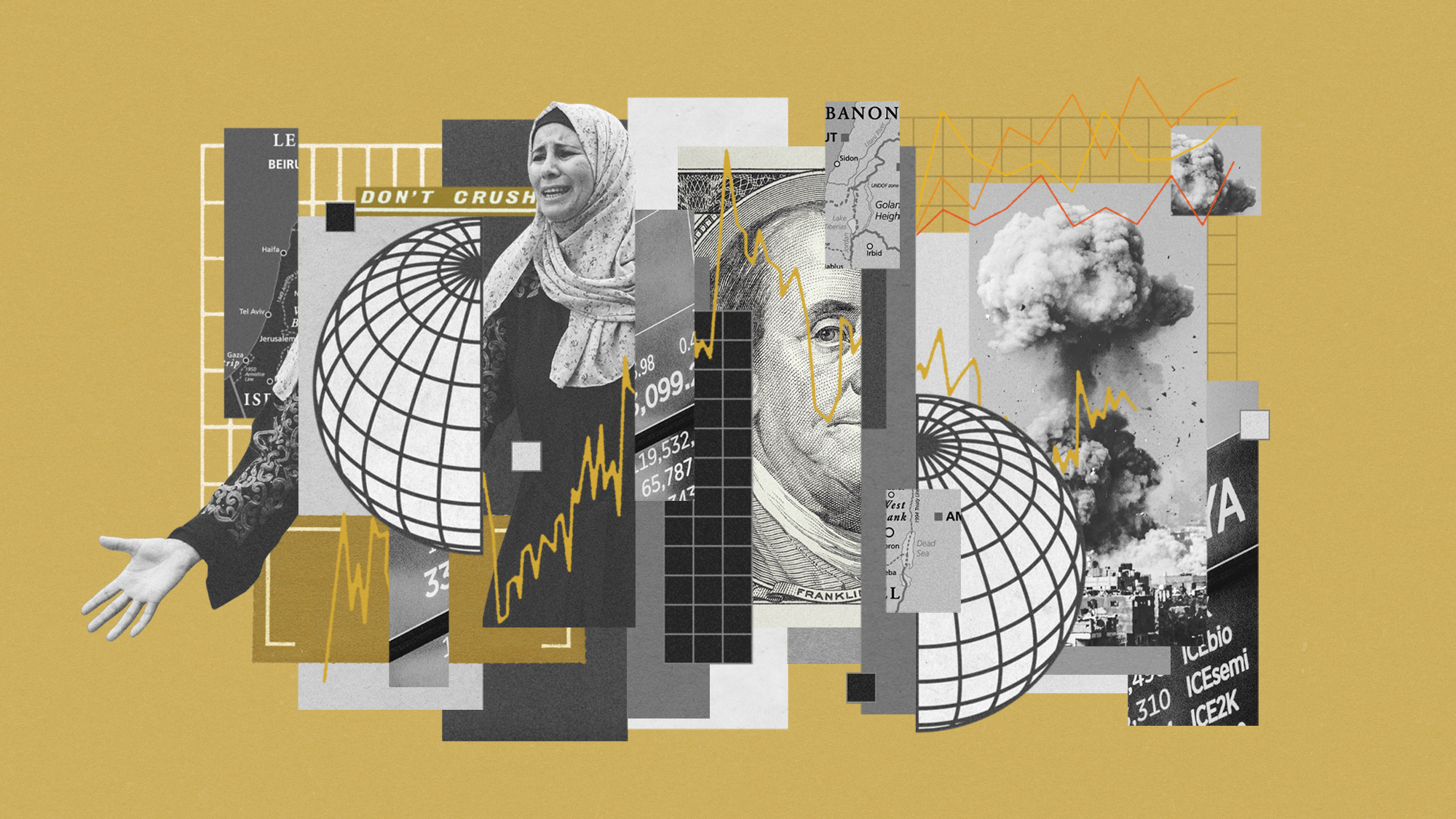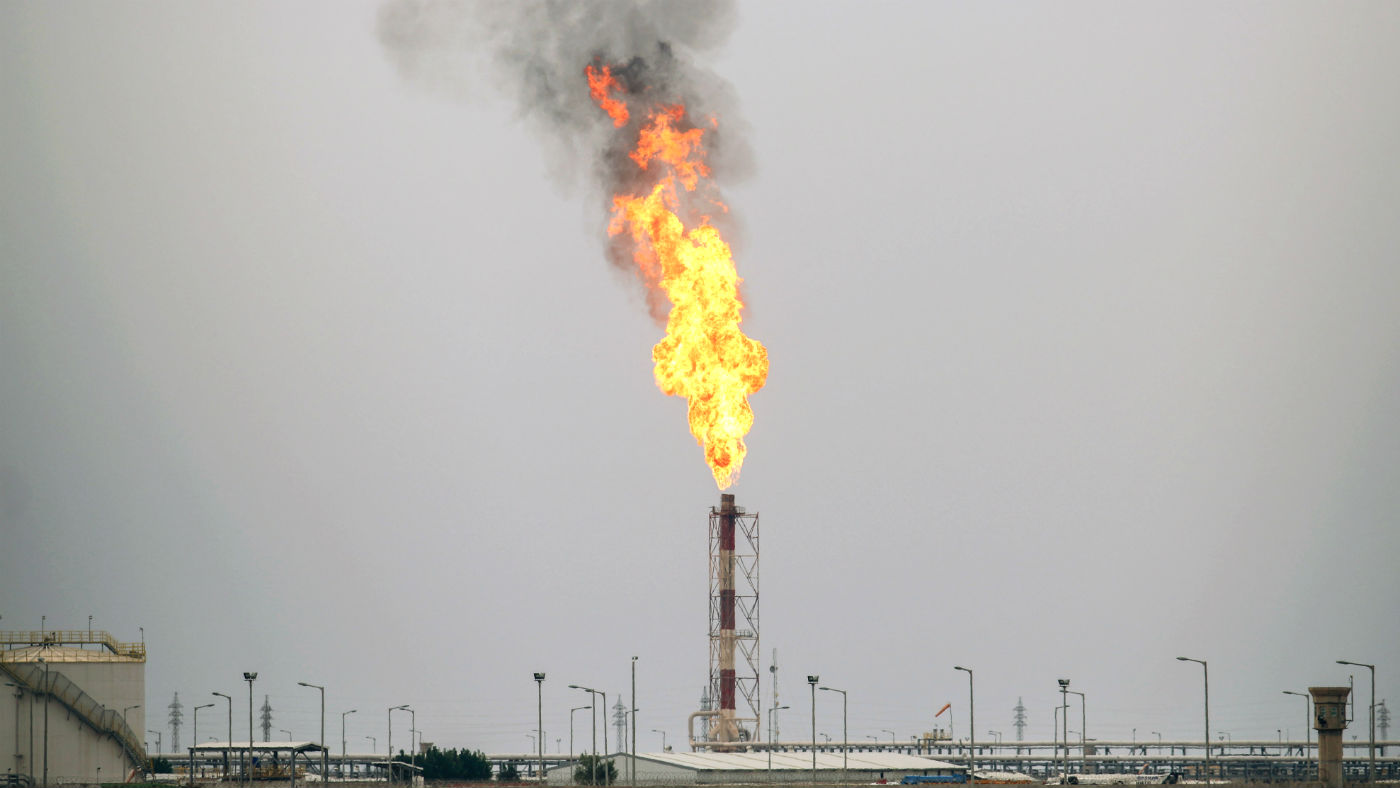Oil price posts two-year highs - but how long can it last?
Brent rose above $59 a barrel this week, its best third-quarter showing since 2004

A free daily email with the biggest news stories of the day – and the best features from TheWeek.com
You are now subscribed
Your newsletter sign-up was successful
Oil price: $80 a barrel is on its way, says analyst
21 June
A high-profile analyst has told clients to "prepare for oil at $80 a barrel", Bloomberg reports.
In a note to customers, a team led by J Marshall Adkins at US financial service company Raymond James & Associates said ongoing production disruptions and rising demand will keep the market in supply deficit. This will drive a strong rally that will see oil "average about $30 [per] barrel higher" than current estimates, they add.
The Week
Escape your echo chamber. Get the facts behind the news, plus analysis from multiple perspectives.

Sign up for The Week's Free Newsletters
From our morning news briefing to a weekly Good News Newsletter, get the best of The Week delivered directly to your inbox.
From our morning news briefing to a weekly Good News Newsletter, get the best of The Week delivered directly to your inbox.
Raymond James's call singles out in particular the "fracklog" in US shale, referring to wells where drilling has been put on hiatus because of low prices. Many believe these wells could be restarted quickly if oil remains at current levels, returning the market to oversupply.
But Adkins and his colleagues argue "bottlenecks that include a limited available pool of labour and equipment" will discourage this. They also cite "organic declines in China, Columbia, Angola, and Mexico" as reducing supply outside of the US.
On the other side of the fence, the Financial Times reports that shale producers Continental Resources, EOG Resources and Oasis Petroleum have already started to complete some of their unfinished wells.
It adds that the likes of Citigroup and oil consultancies Wood Mackenzie and Rystad Energy believe this will add to supplies by 250,000 to one million barrels a day by the end of this year.
A free daily email with the biggest news stories of the day – and the best features from TheWeek.com
This will not be sufficient to prevent supply slowly declining following a reduction in investment over the past two years, it continues, but it could be enough to "delay the rebalancing of the global oil market, pushing it further back into 2017".
Oil is taking something of a breather today after a two-day rally and a three per cent advance on Monday. International benchmark Brent crude remains above the important $50 a barrel mark.
Oil price push back towards $50 as Brexit fears ease
20 June
Oil bucked a seven-session losing streak on Friday and has powered on this morning, closing in on a return to $50 a barrel for the first time in more than a week after an easing of Brexit concerns.
Many believe this will prompt a swell of support for the In camp in the face of hostile immigration messaging from pro-Brexit groups.
Added to that, polls over the weekend showed that support for Remain was growing even before the tragedy, with the two sides back on par after a two-week surge for Leave. Betting odds now put the chances of an Out vote at less than 30 per cent.
This has prompted a strong risk rally, sending the FTSE up two per cent and Brent by another 1.5 per cent. At around 11am in London today, it was closing in on $50 a barrel for the first time since hitting a new eight-month high two weeks ago.
The gyrations in EU referendum polling could mean oil is sent on a "wild ride", warned analysts last week.
Oil is not directly affected by the vote but given the forecasts of most economists that a Leave victory would prompt a major slowdown and even potentially a recession in the UK and Europe, as well as reduced growth around the world, Brexit is seen as negative for demand.
There would also be knock-on effects for the dollar, which would almost certainly surge against the pound, making oil more expensive around the world, which is again, negative for demand.
Helping oil higher, Forbes reports Saudi Arabia and Iran have been charging a higher price for their output, rising above $47 a barrel in recent weeks. This comes amid a prolonged turf war that had seen the two rivals seeking to undercut each other to win business in Asia in particular.
Oil price push back towards $50 as Brexit fears ease
20 June
Oil bucked a seven-session losing streak on Friday and has powered on this morning, closing in on a return to $50 a barrel for the first time in more than a week after an easing of Brexit concerns.
The Wall Street Journal notes a near three per cent gain for international benchmark Brent crude on Friday followed the killing of pro-Remain MP Jo Cox.
Many believe this will prompt a swell of support for the In camp in the face of hostile immigration messaging from pro-Brexit groups.
Added to that, polls over the weekend showed that support for Remain was growing even before the tragedy, with the two sides back on par after a two-week surge for Leave. Betting odds now put the chances of an Out vote at less than 30 per cent.
This has prompted a strong risk rally, sending the FTSE up two per cent and Brent by another 1.5 per cent. At around 11am in London today, it was closing in on $50 a barrel for the first time since hitting a new eight-month high two weeks ago.
The gyrations in EU referendum polling could mean oil is sent on a "wild ride", warned analysts last week.
Oil is not directly affected by the vote but given the forecasts of most economists that a Leave victory would prompt a major slowdown and even potentially a recession in the UK and Europe, as well as reduced growth around the world, Brexit is seen as negative for demand.
There would also be knock-on effects for the dollar, which would almost certainly surge against the pound, making oil more expensive around the world, which is again, negative for demand.
Helping oil higher, Forbes reports Saudi Arabia and Iran have been charging a higher price for their output, rising above $47 a barrel in recent weeks. This comes amid a prolonged turf war that had seen the two rivals seeking to undercut each other to win business in Asia in particular.
Oil price 'in for a wild ride' next week
17 June
The oil price rose for the first time in seven sessions in Asian trading overnight – but only after recording the largest one-day fall for two months and dropping below $48 a barrel.
International benchmark Brent crude was up 1.6 per cent to a little below $48 at around 10.20am in London today. This is a far cry from the $53 peak reached last week and follows a 3.6 per cent slump in the previous trade, the steepest since April.
A two-stage rally from a 13-year low of $27 a barrel in early February has followed sentiment on oversupply in the market. For a time, it appeared a deal to cap an output glut would be forthcoming, but this has since given way to short-term pipeline disruptions in Canada, Nigeria and elsewhere.
These issues are being resolved, however, and this week's US stockpile draw was modest. With Opec members still not exercising restraint and speculation higher prices could bring lost US production back on-line, supply optimism has been waning.
But more important to the short-term oil price trend is the looming EU referendum next week, which is now dominating sentiment on global markets amid warnings from central bankers.
Oil is being hit by the general fear that Brexit could prompt a demand-dampening recession across Europe that would have ripple effects around the world. The Bank of England yesterday described the knock-on effects of Brexit as the "largest immediate risk" facing global financial markets.
In addition, the UK leaving the EU will almost definitely prompt a rise in the "safe-haven" dollar and make crude more expensive for most global buyers.
"I don’t think it’s any coincidence that you see both energy down... and equities down," Bob Yawger, the director of the futures division at Mizuho Securities USA Inc, told the Wall Street Journal. "It’s a ‘risk-off’ environment that we’re operating under globally."
"We need to brace ourselves for further volatility," Ben Le Brun, a market analyst at OptionsXpress in Sydney, added in comments to Reuters. "It is certainly going to be a wild ride for investors and traders going into the June 23 decision," he said.
Oil price could remain below 2016 highs 'for months'
16 June
Influential analysts at Goldman Sachs have returned to taking a more negative view on the oil price, warning it could fail to return to recent 2016 highs "for months".
The bank's brokers made headlines with their suggestions last year that oil could slump to a "cost price" of around $20 a barrel. In early February, international benchmark Brent crude crashed to $27, a near 13-year low.
Since then, trading has enjoyed a recovery that peaked at $53 a barrel last week, the highest for eight months, before embarking on a five-session slide.
Declines continued on Wednesday, Reuters notes, despite a report from the US energy Information Administration pointing to a modest draw on domestic crude stockpiles of 933,000 barrels last week.
This confounded consensus expectations and contrasted with a private sector report on Tuesday showing a hefty rise in reserves.
The price fall, which took Brent below $49 a barrel at the close in New York and to around $48.30 by 10.30am in London today, was instead based on demand concerns prompted by macroeconomic factors.
In particular, the Federal Reserve held firm on projecting two rate rises this year, despite a worsening economic outlook, and the UK looks ever-more likely to vote for Brexit at its EU referendum next week.
Both are likely to push the dollar higher, making oil more expensive for overseas buyers. Coupled with ripple effects across the global economy of the expected turmoil caused if the UK does decide to leave Europe, this could prevent the market return to supply-demand balance.
Goldman Sachs similarly pointed to concerns over supply. An improved picture in areas such as Nigeria and Canada, both hit by output outages, record exports from the likes of Saudi Arabia and Russia and lower-than-thought production declines in the US all suggest oversupply could soon return.
"We view the price recovery as fragile," the bank said in a note, reported by the Daily Telegraph. "We continue to expect that prices between $45 a barrel and $50 a barrel in coming months are still required to bring the market into a deficit in the second half [of this year]."
Any deficit in the second half of 2016 "will remain modest at current prices", continued the bank, and that a return to surplus is "likely" in early 2017, CNBC reports.
-
 The ‘ravenous’ demand for Cornish minerals
The ‘ravenous’ demand for Cornish mineralsUnder the Radar Growing need for critical minerals to power tech has intensified ‘appetite’ for lithium, which could be a ‘huge boon’ for local economy
-
 Why are election experts taking Trump’s midterm threats seriously?
Why are election experts taking Trump’s midterm threats seriously?IN THE SPOTLIGHT As the president muses about polling place deployments and a centralized electoral system aimed at one-party control, lawmakers are taking this administration at its word
-
 ‘Restaurateurs have become millionaires’
‘Restaurateurs have become millionaires’Instant Opinion Opinion, comment and editorials of the day
-
 How might the Israel-Hamas war affect the global economy?
How might the Israel-Hamas war affect the global economy?Today's Big Question Regional escalation could send oil prices and inflation sky-high, sparking a worldwide recession
-
 Recent mega-mergers could signal a turning point for the US oil industry
Recent mega-mergers could signal a turning point for the US oil industryTalking Point Both Chevron and Exxon have recently spent billions to acquire smaller oil companies
-
 Has Saudi Arabia lost control of oil prices?
Has Saudi Arabia lost control of oil prices?Today's Big Question Kingdom goes it alone to cut production, risking tension with US and reigniting cooling inflation in Europe
-
 US angered by Opec+ oil cut
US angered by Opec+ oil cutSpeed Read Energy prices to rise further as producers slash supply by two million barrels a day
-
 Global oil demand forecast lowered for 2020 and 2021
Global oil demand forecast lowered for 2020 and 2021Speed Read IEA report says jet fuel demand remains the major source of weakness
-
 Are US-Iran tensions flaring again?
Are US-Iran tensions flaring again?In Depth Trump threatens military action over Twitter
-
 Can a deal be struck to raise oil prices?
Can a deal be struck to raise oil prices?In Depth Opec+ will convene today over video link in a bid to boost crude
-
 What do negative oil prices mean?
What do negative oil prices mean?In Depth Perfect storm of oversupply and storage shortages sees producers paying to get rid of US crude